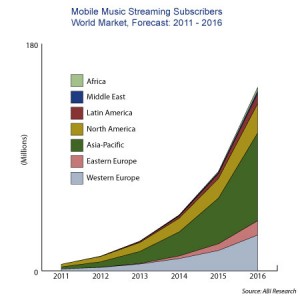It appears that Google has all but finished its version of a music service to be bundled with then new version of the Android OS. According to CNET, am applications developer installed a version of the Honeycomb version of Android and accidentally discovered the Google Music service in it. According to other reports, Google is in negotiations with the record labels for the rights to be able to stream music to Android-powered devices.
In they agree in some terms and Google indeed is able to offer the service, it will be an interesting development with profound impact in the industry. The most important one will have to do with monetization by the labels. Seeing the traditional modus operandi of Google, the most likely offer to customers will be an advertising-based service. Not in vain its YouTube service is already a force in videomusic distribution: as of today, the four most viewed videos worldwide are four music videos: Justin Bieber with a staggering 500 million views, Lady Gaga with 360, Shakira with 321 and Emiem with 310 million. Eight of the top ten are music videos. Monetization is made via pre-rolls, and artists of all types and relevance in the music world use YouTube as a channel to communicate with fans and promote their live performances.
The future Google Music streaming service, then, will likely be an advertising-based service where the user will select what he or she wants to hear and Google will insert advertising either in audio form (likely) or graphic in the interface, or both. It remains to be seen how labels and Google will split the revenue. If the model is comparable to Adsense, where the owner of the original page where the advertisement is inserted receives a percentage, the label whose song is played will receive a cut of the price of the ad. This would make sense as the songs more listened to, or attractive to segments more sought after by advertisers, will get more revenues than less popular or marginal pieces.
The impact on services like Spotify (that just announced it has reached the one million paying subscriber mark, out of ten million registered non-paying users) and Lala will be large. They will certainly hurt if all Android devices have a buil-it Google player. 
Google’s (and many other companies for that matter) interest in streaming steam from the staggering forecasts for streaming music subscribers (see insert). With the advent of next generation wireless services, better compression software, and faster chips in mobile devices, it seems that soon it will make little sense to walk around with ten thousand songs in ones’s pocket. This technological advances, though, post another question for the future: given our innate tendency to “own” things, and the increasing popularity of cloud-based storage, will the future be something like that I will have all “my music” guarded by a storage service in the cloud, the same way I have my documents? Likely. But there is a twist: the number of different songs is finite, and the number of identical copies of the same song stored by a provider will presumably be enormous and indistinguishable form one another. The service provider will simply store one copy of “Only You” and label it for as many owners as there are. We will all believe it is a copy “only for me”, but it will be the same high quality one for each of us. In fact, as commercially available music and movies are concerned, a “cloud storage” service needs the same storage as a streaming provider with access to all catalogs.
All things considered, it looks like Google’s entrance in music will have a disruptive effect in the nascent streaming market and for a long time, Google might have come up with a revenue-generating business model that is consistent with its search-ads-apps tag line.



TE ADJUNTO RESUMEN DE UN ARTÍCULO QUE COMPLEMENTA LA INFORMACIÓN QUE HAS DAD.
Ya han comenzado las pruebas de Google Music en algunos países, el servicio de música en streaming que simularía al canal de vídeos de YouTube, y del que se especula que estaría listo para su lanzamiento de manera inminente.
Varios medios online destacan estos días que el servicio Google Music se encontraría en su fase final de desarrollo, previa a su lanzamiento. Dicho servicio va a suponer un nuevo competidor en el mercado frente a los actualmente conocidos como Spotify, Last.fm y otros tantos, en un mercado donde iTunes de Apple hace tiempo que acapara casi la totalidad del mercado.
Hasta el momento, poco se sabe del tipo de servicio que ofrecerá a los usuarios, salvo que permitirá almacenar canciones en los servidores, con posibilidad de reproducirla de manera remota y conectándose al servidor con un simple “inicio de sesión”. desde la cuenta de correo de Google. La idea es hacerla accesible a cualquier plataforma, para que el usuario pueda conectarse desde su ordenador, o bien, desde su teléfono móvil allá donde se encuentre, de la misma manera que vien sucediendo actualmente con Google YouTube.
A diferencia de iTunes, Google Music estará basado en un servicio accesible mediante cualquier dispositivo con conexión Web, basándose en la conexión en streaming. Recientemente, desde el foro de desarrolladores XDA han destacado, que el servicio de Google Music viene instalado de serie en los dispositivos con Android 3.0, cuyo nombre en código es Honeycomb. Por su parte, muchos especulan con que el retraso es producido por las negociaciones de Google con las casas discográficas para llegar a un acuerdo sobre la modalidad del servicio y el reparto de beneficios.
En algunos países, como podemos ver en la India, el servicio Google Music India labs se encuentra englobado dentro de las herramientas de pruebas del Laboratorio de Google, aunque accesible y abierto a los usuarios. Principalmente, es posible ver temas de canciones y bandas sonoras de películas, aunque las búsquedas realizadas en el campo de búsquedas, es posible desplegarla por artistas, álbumes, o canciones